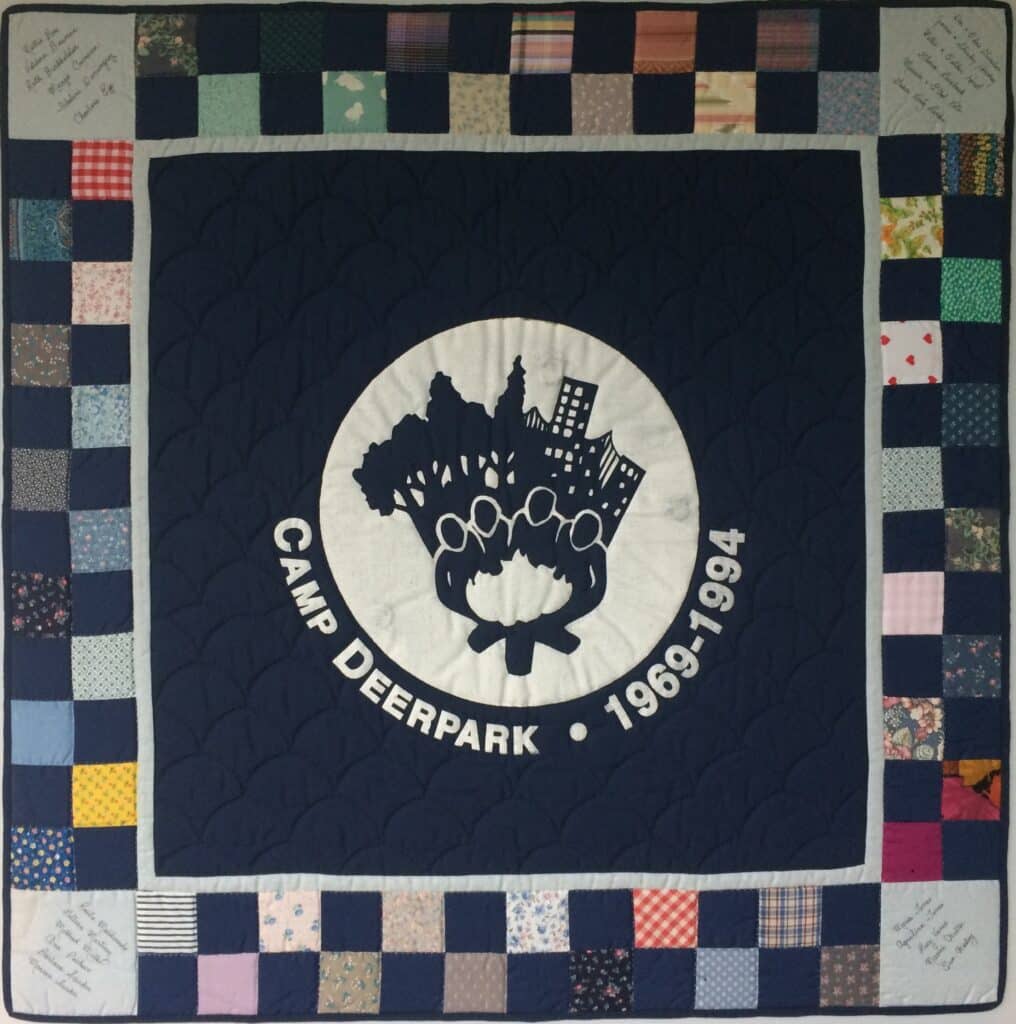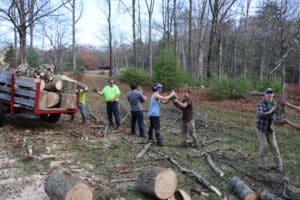Camp Deerpark and I
As an 11-year-old farm girl from Lancaster County, Pennsylvania, I was enthralled riding over the awesome and expansive George Washington Bridge into Harlem, in New York City, in 1956–58. That bridge has remained a landmark in my soul until this day.
We visited our sister and her husband, Grace and Jacob Good, who lived in the tiny apartment behind the Seventh Avenue Mennonite Church. Jacob was serving in 1-W service as his alternative to serving in the military.
After Grace and Jacob moved to Reading, Pennsylvania, I kept attuned to urban ministry in Reading and in New York City. I learned about the Seventh Avenue Mennonite Church fire from Dottie Nolt, now Weber. As an Eastern Mennonite University residence director, I took special care of the students from cities and other countries. In 1981, I took the Eastern Mennonite Seminary course “Cross Cultural Evangelism” in which we spent a week in New York City with Dale Stoltzfus instructing us. This was one month after my sister, Grace, passed away, and it was emotional and comforting to visit the church my sister had been a part of in its early days.
My summer job was being cook at Camp Hebron. There I met Jesus and Mim Cruz, who were from New York City. I learned about Camp Deerpark from Lanny Millette, a college friend who was on the summer staff. I was happy when Mim Cruz hired me to cook at Deerpark for two summers. Reuben and Dorothy Stoltzfus surprised me when they brought my parents, Amos and Barbara Sauder, along with lots of sweet corn, to camp. Those summers reconnected me with children and churches in New York City.
While in seminary in Elkhart, Indiana, I had friends who studied urban ministry in Chicago. We discussed how the Bible relates to the inner city. After seminary, I took a job at Heartsease Home for teenage girls in Manhattan and moved across the George Washington Bridge into an apartment above Seventh Avenue Mennonite Church, about 30 years after I had first crossed the bridge. Later I moved to an apartment in the Bronx above the apartment where Jesus and Mim Cruz lived.
While working in jobs with New York City Children and Family Services, I served as secretary of the New York City Council of Mennonite Churches and was on the Camp Deerpark Board of Directors. I participated in Seventh Avenue, Manhattan Fellowship and North Bronx Mennonite churches.
When we as a camp board were searching for a new administrator, Gene Shelly and Ray Pacheco addressed me with what I first thought was an absurd idea, that I could do the job. I talked with Bill and Ann Troyer from the Bronx. Bill was asked to be director of maintenance, and they agreed to serve at camp. The Lord helped me realize how much I cared for the churches and for camp, so I accepted the job and served from March 1,1990, through October 31, 1995.
One of my goals as administrator was for the churches to enjoy and own Deerpark as their camp. And I wanted for the volunteers and supporters from Pennsylvania to know the beauty and riches of the churches and people of New York City. When a church youth group came for a week of service, I took them to Seventh Avenue in the city for Sunday worship and spent the afternoon sightseeing. For morning devotions, I read Bible images of the city where people felt safe and secure within the city gates while thieves and robbers roamed the countryside.
I found that in Hebrew a “camp” is a temporary (never permanent) protective enclosure. The word “camp” comes from the verb “to bend, curve.” I had Psalm 34:7 written on the bottom of the camp stationary: “The angel of the Lord encamps around those who fear him, and delivers them.” Sue Schlabach (wife of Ryan Newswanger and daughter-in-law to Wes and Marian) used a campfire when designing a new graphic for the 25th anniversary celebration.
I never got over choking-up with tears when I heard the bus come groaning up the hill, whether filled with campers or a church group, and then seeing it round the bend in the road. It was a holy moment, knowing that God was present and would speak to all of us anew through worship, nature and fellowship. I liked being present at baptisms in the pool. The sound of people singing in differing languages in the chapel and around the campfire still rings in my soul. I loved the face-to-face conversations with campers and staff, including people from differing cultures. When we settled the bill in my office at the end of a retreat, I enjoyed hearing the pastor recount what had happened over the weekend. Tears almost came again as the bus and cars left camp, going out of sight as they rounded the corner, returning to their homes in the city. We all had been touched by an Almighty God.
Not everything went smoothly. In one of the skits planned for camper devotions, the mostly African-American and Hispanic staff had a white young man in the role of Jesus and an African-American young man as the devil. I had them modify the skit and one staff person said that I interfered with the spirit—the message of the skit didn’t come through. One lesson I wasn’t happy about was when staff used hearts with differing colors, the black heart representing sin. I had African-American friends and church leaders (Hubert and Helen Brown) and had listened to them for 25 years speak of their concerns about race and how the Scriptures related to them. I was emotionally involved with the concerns of the civil rights movement. A board member, Doris Perkins from Seventh Avenue, said that I had done the right thing in the first mentioned instance. But I see that I must be in conversation and listen to others define racism.
The New York State Health Department required that children and youth “sleep-away camps” have a pool lifeguard certified to teach campers to swim. One summer the staff person whom we expected to be our lifeguard didn’t complete her training. Johnette Benjamin, the program director, and I contacted every aquatic training program we could find in New York City and in Orange County and communities around camp in search of a qualified lifeguard. The Christian camp down the road from us also needed a qualified lifeguard.
A professor who summered up the road from camp was qualified but she didn’t want to lifeguard. A qualified woman from New York City called for an interview and then didn’t show up. During that time, as I gathered towels from the wash line, I looked at the pool and thought: “It can’t be God’s will that we have no lifeguard for the campers.
”I sat in the office that Tuesday morning, knowing that campers in the city had already boarded the bus and were on their way to camp. I just couldn’t pick up the phone to call many different aquatic programs and hear people say one more time, “We don’t know of anyone available to serve you.” But I couldn’t bear to think of a summer with campers not being able to jump into the pool. So, I prayed again, picked-up the phone, and in my second call to the city, an instructor said he knew of someone who just completed training and may be available.
Ten minutes later, Constantine, a Russian young man, called and we setup the next morning for an interview. I can still see that red car coming up the road and recall the knowledge that God was answering our prayers. Constantine served both of our Christian camps. Some campers and even staff thought he was a little too strict as a lifeguard. I couldn’t have cared less about their complaints. I knew how close they had come to not being able to go to the pool at all; and I knew they were safe under his careful eye.
That summer an Ethiopian young man, Helina, was on staff. Both he and Constantine had lived under communist regimes. I felt like I touched base with another world. Under usual circumstance we didn’t hire staff who claimed no religion. But this hiring turned out okay. Constantine attended campfire. And he was so respectful to everyone and of the camp.
As I worked hard managing everything, I felt good knowing people were experiencing God and nature. Many of the campers had moved to New York City from the South or immigrated from other countries. When they touched the soil, and breathed in the country air, their souls also touched the soil of their home state or homeland.
Garifuna women played soccer while barefoot. Some women gathered tea by the stream to take home with them. We had a lame duck by the pond and the other ducks were mistreating it. Some West Indian women from Guyana heard staff discussing it and asked if they could dress and cook the duck. We said yes and they seemed blessed to be able to cook up fresh fowl for their group. They dressed it in the kitchen. This was after the summer camping season and I felt that the health department wasn’t likely to stop by.
There is intimacy in lodging and feeding groups of people. One learns about distinctions in their cultures. One group asked for an iron as they royally prepared to honor God in worship Sunday morning, looking their best. When I found iron marks on the carpet I didn’t care because the carpet was well-worn.
The people who had more recently immigrated to the city were the ones most grateful for the camp facilities. The people with the higher incomes had the most complaints. I felt at times that people wanted “resort facilities” at “rustic camp” prices. I was ashamed of the Annex building but the other facilities were okay. God blessed camp with many volunteers who gave money and helped to make upgrades to the facilities over the years. We got bales of comforters from the Mennonite Central Committee Material Resource Center, which added color to the rooms. It was simply fun and a blessing to learn to know and interact with so many people.
When Bill Troyer resigned from his position as director of maintenance, Lester Sutter, a camp board member and pastor of Redeeming Grace Fellowship on Staten Island, brought his brother-in-law, Orville Egli, to come and see camp and maybe apply for Bill’s job. Orv was from Hopedale, Illinois, and had gone to Staten Island to do a major renovation of the church parsonage next to the church they had purchased, but the city building permit was on hold.
I was so happy and relieved when Orv accepted the position because he seemed like he could fix everything about everything. There was a closet between the porch and office in the lodge that held sports equipment and whatever was thrown into it. Orv removed the wall and the office was open with a view to the front of the lodge. He added a semi-bath and two rooms in the administrator’s house basement where I lived in addition to keeping up with all the major and minor maintenance. On occasion he was camp’s ever-fastest dishwasher.
I was impressed that someone who had always lived within a 10 mile radius in rural Illinois could come and live in the mountains and enjoy relating to many different people. He knew folks in Staten Island, but I showed him more of the city by taking him to Seventh Avenue on a Sunday morning. After church we walked to a “soul” restaurant for lunch. Orv noted that he and I were the only white people on the sidewalk. Since I acted like I knew what I was doing, he thought we must be okay. We attended the Ethiopian pastor’s ordination in the afternoon.
Orv and I worked well together. We listened to our hearts, and Lester Sutter married us on April 29, 1995, at Redeeming Grace Fellowship. We stayed at camp until October 31. Orv had brought his motorcycle to camp, and staff saw a new me when I rode with him up the hill to see Walter and Jacqueline Mehr. I already had a strong friendship with them, and Orv and Walter enjoyed each other’s companionship. It was fun to do things with them as a couple.
Yes, finances were a constant struggle. During my first summer, when bills were piling high and I didn’t know what to do, I spoke to the chairman of the New York City Council of Mennonite Churches. He said, “What is the board doing about it?” I talked with the board chairman, who was from Pennsylvania, and he said, “The people in New York City need to learn that they can’t depend on the people from Pennsylvania all of their lives.” Barb Freeman gave me support as we worked together in the office. I valued her friendship and good work.
At the end of my five-year term the board offered me another two years to serve. I was tired. I did so much hands-on work. I felt that camp needed an administrator to focus on development and marketing. Orv suggested that camp needed a broader relationship with the local community. I served an additional eight months and then was grateful to hand the care of Camp Deerpark over to Ken Bontrager. I’ll always be grateful for the treasure camp was to me.
Marian Sauder Egli, former board member, camp director 1990–95.
Related Entries
Share:
Come and Pray Lunch & Retreat
Come and PrayPrayer Day with Lunch March 14, 9am-3pm~$30~ Overnight Prayer RetreatMarch 13-14includes March 14 Lunch~$120~ Come seek the Lord’s face with your faith family from all over the Tristate region for a relaxing time of prayer and discussion. We know God is doing amazing things — and he will continue to do more as…
Time to Pray
As followers of Jesus, he is our example in everything. When Camp says in our mission statement that we are “a community of Christ” – this is what we’re saying: we’re a group of people dedicated to the purpose of following and being like Jesus. So the question is, how do we follow Jesus as…
A Place of Prayer
Prayer — especially “vertical prayer” for specific God-revealed mission set apart from the concerns of our life and ministry — is a major theme for Camp in 2026. Maybe you read about this in the Winter Newsletter article “Time to Pray“? We want to extend the invitation to the entire Camp community and beyond —…
Living Abundantly Retreat
Jesus promised his followers an abundant life. Is that just an abstract idea to distract us from earthly misery, or is there real power in Christ to live a full and rich life in the here and now? Young adults are navigating a challenging landscape as they start “adulting” and building a life, so we’ll…
Forgiving Debts: 2025 Woodcutting Season
When Jesus taught his disciples to pray (Mt 6:9-15), he described two big realities where “thy Kingdom Come, thy will be done on Earth as it is in Heaven” are realized in the human world: First, he said “give us this day our daily bread”, acknowledging that God’s provision for human need is a central…
“How Do I Donate?”
Recently, a thirteen-year-old guest at Camp asked Operations Director Kevin Smith, “how do I donate?” Kevin was honestly a little surprised, but was happy to see this young member – who was on retreat with one of our owning churches — taking some initiative. Kevin directed him to the website Donate page, and the young…
The Discipleship Down-Low
Defining Discipleship 18 And Jesus came and said to them, “All authority in heaven and on earth has been given to me. 19 Go therefore and make disciples of all nations, baptizing them in the name of the Father and of the Son and of the Holy Spirit, 20 teaching them to observe all that I have commanded…
The Virtuous Wife
This past weekend, Camp hosted three women’s retreats at Camp. Though the retreat groups were very diverse in background – one was from an urban church plant in Philadelphia, one was from a Garifuna Mennonite church in Brooklyn (an Afro-Caribbean Culture), and one was from a multi-ethnic faith community reaching out in North Jersey. Though…
A Life of Service
I believe the most important thing to God is not our personality, knowledge, or talents, but our availability. How willing and ready are we to respond when He calls, and how ready are we to do what He says? What use to the Lord are people who could do what he wants with excellence and…
Building Belonging
At our February NYC LMC District meeting, we’re discussing the Belonging phase of The Journey Map. In this first phase on the map, individuals and groups on a spiritual journey begin the process of connecting to each other and evaluating the place they may have in each other’s lives. Have you ever been an outsider…





